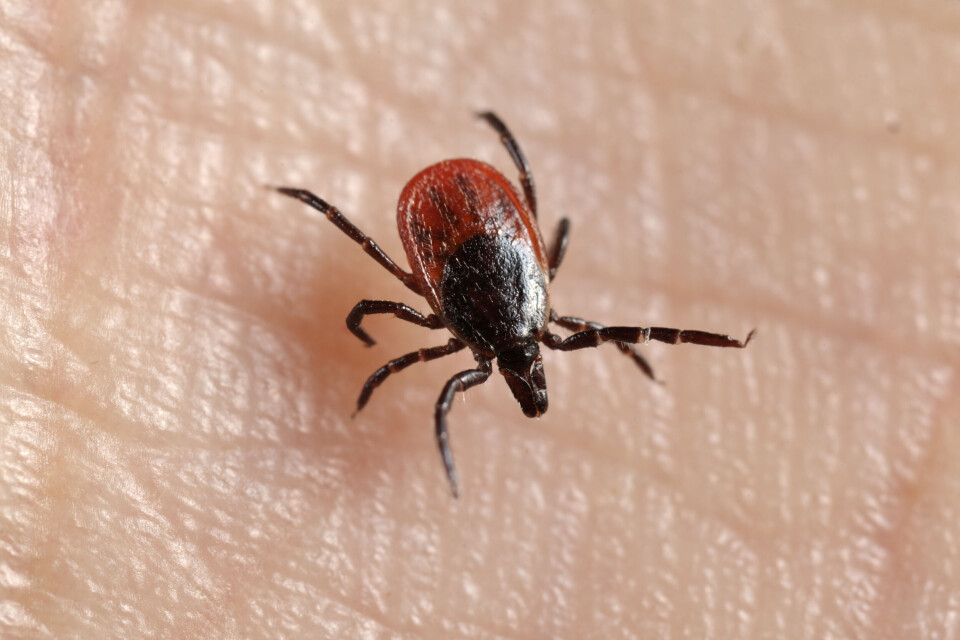-
Festive travel warning for France residents as EU digital border checks expand
The EU’s EES digital borders system is being rolled out progressively
-
Road blockades by farmers continue on Monday despite call for Christmas truce
A meeting between local union leaders and officials in Toulouse will determine pre-Christmas blockades
-
Retired French butcher takes Chronopost to court over year-long missing parcel
Parcel containing homemade foie gras went missing in December 2024 but butcher says company did not acknowledge issue
Lyme disease: Researchers work on a vaccine to reduce danger of ticks
In the last six years, more than 72,000 tick bites have been reported in France

Researchers in France are working on a vaccine that could reduce the danger of tick bites.
The national agriculture, food, and environmental research institute, l'Institut national de recherche pour l’agriculture, l’alimentation et l’environnement (Inrae), released a statement on the research this week.
It said it has been working on vaccine trials to reduce the level of infection by the bacteria that causes Lyme, which is spread by ticks.
But no vaccine for Lyme yet exists “despite much research”, Inrae added.
Instead, researchers have been working on the ticks themselves - in a partnership between Inrae, France’s national food and environmental safety agency l'Agence nationale de sécurité sanitaire de l'alimentation, de l'environnement et du travail (Anses), and the Alfort veterinary school (Val-de-Marne).
They have been testing a vaccine that disrupts the tick’s microbiota, which is where the Borrelia bacterium lives. This bacterium is responsible for Lyme disease.
The vaccine has been tested on mice, using a harmless bacterium for the experiment, “like a Trojan horse”, Inrae said.
Inrae stated: "Once in the body, this harmless bacterium causes the mouse to produce antibodies. If the mouse is then bitten by a tick, these antibodies interact with the tick's microbiota and modify it [to include less Borrelia].”
It said that analysis of ticks after they bite shows that they later carry much less Borrelia than those that had bitten unvaccinated animals. This means that as the ticks bite vaccinated animals, they become less infectious.
Unfortunately, the vaccine does not protect the bitten animal from Lyme, but the idea is that over time, the ticks themselves will become less dangerous.
Lyme in France
Between 0-20% of ticks in France carry Lyme disease, depending on the area. The risk is more pronounced in the east and centre-east than in the west, and some parts of the south, but the issue is spreading.
Read more:
-
Where in France you are most at-risk from Lyme disease ticks
-
More risk of Lyme disease from ticks in east France than in Brittany
Since January 2017, more than 72,000 tick bites in total have been reported, show figures from the health authority Santé publique France.
The Hyalomma tick, which carries the disease, originally comes from Africa and Asia but has been present in Corsica for several decades, and on mainland France since 2015.
However, ticks can also carry other diseases, including tick-borne encephalitis and Crimean-Congo haemorrhagic fever (CCHF).
Since 2021, 71 cases of tick-borne encephalitis have been recorded in France, mainly among men aged 48 on average, but also among four children under 10, and two seniors over 65.
No cases of CCHF have been reported in France, but Anses recently issued a potential alert due to the increased presence of the Hyalomma tick, which means “emergence in France is possible”. Around a dozen cases have been reported in Spain, of which some were fatal.
How can I avoid being bitten?
Bites are most common in summer and typically happen in forest areas, fields and areas of long grass, and damp or marshy spaces.
To avoid being bitten, Santé publique France recommends:
-
Wearing a hat to protect against ticks falling from trees
-
Tuck your trousers into your socks to avoid ticks climbing up from the ankles
-
Wear long-sleeve tops and long trousers
-
Stay on paths and avoid going into the long grass
-
Spray anti-tick and anti-insect repellent on your clothes and skin
It is estimated that between 30-50% of tick bites occur in gardens and countryside parks, not only in wild forests.
Read more: Lyme disease in France: Official advice on how to avoid a tick bite
Read more: Lyme disease: How to minimise risk of ticks in your garden in France
After you return from spending time outdoors, you are advised to check for ticks. The forestry office l'Office national des forêts recommends:
-
Inspect your body in detail, especially in skin folds and creases
-
Check your scalp, behind your ears and neck
Ticks are only 1-3mm wide, so can be easy to miss. Pets can also be affected, so be sure to brush them or de-tick them after they come indoors, too.
You can also wash your clothes at 60C, or tumble dry them for at least an hour, as ticks do not like dry heat.
What if I suspect a bite?
The Assurance Maladie website Ameli recommends:
-
Taking out the tick as soon as possible. Use a tick removal device (un tire-tique) to get hold of the tick and pull it out, without crushing it.
-
If in doubt, ask for advice at a pharmacy or GP office
-
After taking out the tick, disinfect the area and keep watch on the area for the next month
Ameli adds: “If you see a red rash or inflammation start to spread, between three and 30 days after the bite, you should see a doctor, as it could be an ‘erythema migrans’, which is an early symptom of Lyme disease.”
This rash is usually circular and red, sometimes with a white area in the middle, in the form of a ‘bull’s eye’ pattern.
Symptoms of Lyme are flu-like, including muscle pain, headaches, nausea, and vomiting. Without treatment, it can also cause neurological problems. Early diagnosis is key.
Read also
Lyme disease: Number of people bitten by a tick rising in France
New campaign to alert walkers to risk of Lyme disease in France
























